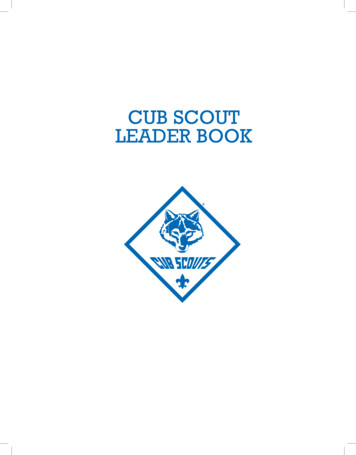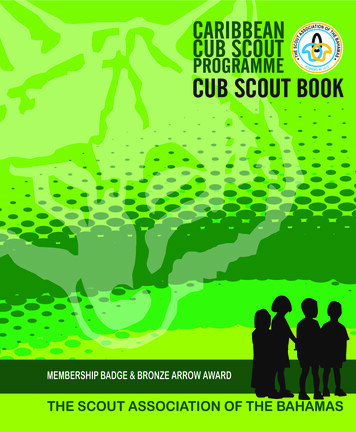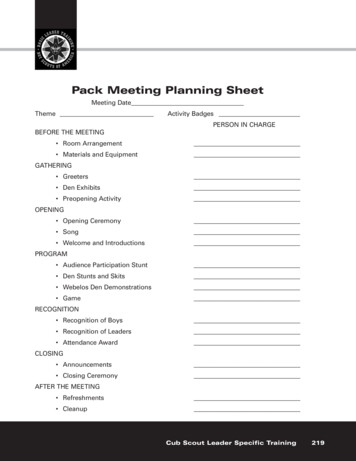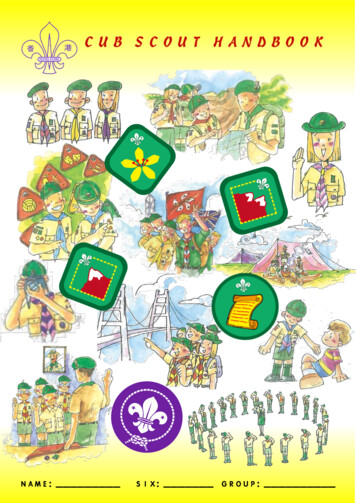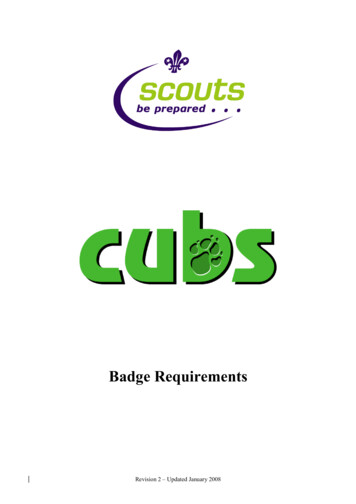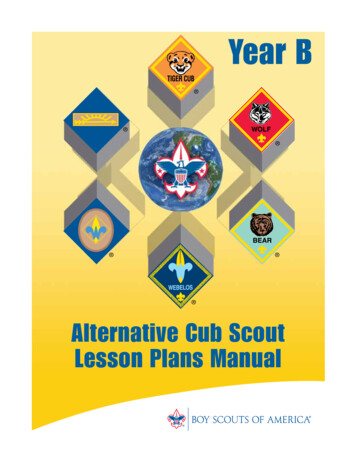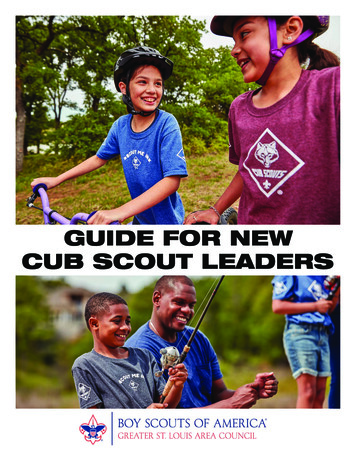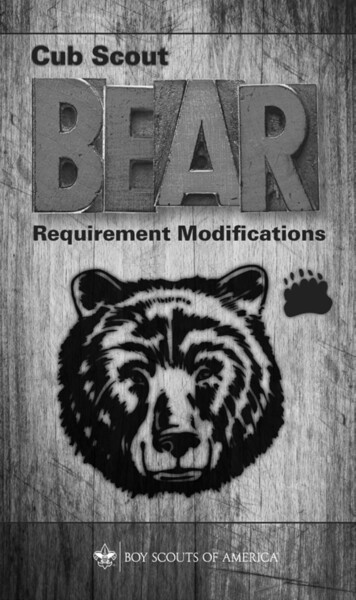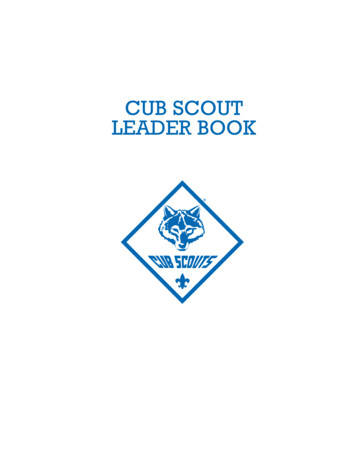
Transcription
Leader Book
THANKS TO YOU,MILLIONS OF BOYS Become More Confident Grow Spiritually Are Better Citizens Learn Life Skills and Have Fun!!You have our eternal thanks for helpingmake this an everyday reality!The Boy Scouts of America welcomes your comments and suggestionson how to improve this resource.Please e-mail your thoughts to CS.Leader@scouting.org.
LEADER BOOK133221 WITHPHOTOS.indd 110/4/10 4:15 PM
A Word About Youth ProtectionChild abuse is a serious problem in our society, and unfortunately, it can occuranywhere, even in Scouting. Youth safety is of paramount importance to Scouting.For that reason, the BSA continues to create barriers to abuse beyond what havepreviously existed in Scouting.The Boy Scouts of America places the greatest importance on providing themost secure environment possible for its youth members. To maintain such anenvironment, the BSA has developed numerous procedural and leadershipselection policies, and provides parents and leaders with numerous onlineand print resources for the Cub Scout, Boy Scout, and Venturing programs.Effective June 1, 2010, the BSA implemented mandatory Youth Protectiontraining for all registered volunteers.New leaders are required to take Youth Protection training before submitting anapplication for registration. The certificate of completion for this training must besubmitted at the time the application is made and before volunteer service withyouth begins.Youth Protection training must be taken every two years. If a volunteer does notmeet the BSA’s Youth Protection training requirement at the time of recharter,the volunteer will not be reregistered.We encourage all adults to take the BSA’s Youth Protection training.To find out more about the Youth Protection policies of the Boy Scouts ofAmerica and how to help Scouting keep your family safe, see the Parent’sGuide in any of the Cub Scouting or Boy Scouting handbooks, or go .aspx.33221ISBN 978-0-8395-3221-7 2010 Boy Scouts of America2010 Revislon33221 WITHPHOTOS.indd 210/4/10 4:15 PM
PrefaceWelcome to Cub Scouting55Cub Scouting Basics7What Is Cub Scouting?Understanding Cub Scout–Age BoysCub Scouts With DisabilitiesHow Cub Scouting Is OrganizedThe Tiger Cub, Cub Scouting, and Webelos Scouting ProgramsWebelos-to-Scout TransitionAdvancement and AwardsLeaders and FamilyLeadersParents and FamiliesYouth ProtectionAdministrationMembershipProgram PlanningEvaluating Den and Pack ProgramsDen and Pack ManagementInsurance and Unit AssetsCharter RenewalFinancing the PackUniforms and InsigniaCub Scout ActivitiesManaging BoysDen and Pack ActivitiesHealth, Safety, and First AidOutdoor ActivitiesCub Scout CampingCub Scout Academics and SportsAppendixCub Scouting ResourcesResources, Forms, and ApplicationsUnit Leadership EnhancementsGlossary/Index33221 WITHPHOTOS.indd 327293638425355717377798594969899101107CONTENTSThe Cub Scouting 0/4/10 4:15 PM
33221 WITHPHOTOS.indd 410/4/10 4:15 PM
WELCOME TOCUB SCOUTINGThis Leader Book is designed to help you make the most of your time as a Scouting volunteer.Whether you are a den leader, a Cubmaster, a committee member, or you take on some otherleadership role, you’ll find the resources here to make your Cub Scouting experience the best itcan be.Our goal is to help you get started quickly; that means quick introductions to some importanttopics and deeper content where appropriate. Where more detailed information is necessary,we’ll refer you to other Boy Scouts of America publications, including content you can find atwww.scouting.org, the BSA’s Web site. We also encourage you to seek help from experiencedleaders in your pack, as well as commissioners—volunteers in your Scouting district whosesole purpose is to support people like you.PREFACEWelcome to Cub Scouting! Since 1930, Cub Scouting has offered fun with a purpose tomillions of American boys. Thanks to volunteers like you, these boys have developed values,learned skills, made friends, strengthened family relationships—and had a great time inthe process.533221 WITHPHOTOS.indd 510/4/10 4:15 PM
33221 WITHPHOTOS.indd 610/4/10 4:15 PM
WHAT IS THIS CUBSCOUTING THING?How do we go about achieving these aims?What about boys?All this and more . . . .CUB SCOUTINGBASICSWhat are Cub Scouting’s foundational aims, beliefs, and values?733221 WITHPHOTOS.indd 710/4/10 4:15 PM
33221 WITHPHOTOS.indd 810/4/10 4:15 PM
What Is Cub Scouting?Cub Scouting is a program of the Boy Scouts of America (BSA), whose overall mission is to helpyoung people build character, learn citizenship, and develop personal fitness. While the BSA servesboys from ages 7 through 20 and girls from ages 14 through 20, Cub Scouting focuses on boys inthe first through fifth grades (or from ages 7 through 10).Cub Scouting Is for All Boys. Cub Scouting is for boys of all sizes, shapes, colors, andbackgrounds. Some are gifted students or talented athletes; others struggle in these areas. Somehave strong, stable families; others face social and economic challenges. Some live in cities,some live in suburban areas, and some live in rural communities. Some have physical, mental,or emotional disabilities that make ordinary activities difficult. Because of its flexibility and itsemphasis on doing one’s best, Cub Scouting easily adapts to all these situations.Cub Scouting Is for Families. The family is the most important influence on boys’ development.Cub Scouting seeks to support the family—whatever it looks like—and to involve families inScouting activities. Cub Scouting is sensitive to the needs of today’s families, and it providesopportunities for family members to work and play together, to have fun together, and to get toknow each other better.Cub Scouting Is Fun. Boys join Cub Scouting because they want to have fun, but they instinctivelyunderstand that fun means more than just having a good time. It also means getting satisfactionfrom meeting challenges, having friends, and feeling they are important to other people. WhenCub Scouts are having fun, they are also learning new things, discovering and mastering newskills, gaining self-confidence, and developing strong friendships.Cub Scouting Has Ideals. In an age when values sometimes seem passé, Cub Scouting maintainsits ideals of character development, citizenship training, and personal fitness. The Cub ScoutPromise is a pledge of duty to God and other people. The Law of the Pack is a simple formulafor good citizenship. The Cub Scout motto is a code of excellence.Cub Scouting Provides Adventure. Cub Scouting helps fulfill a boy’s desire for adventure andallows him to use his vivid imagination while taking part in skits, games, field trips, serviceprojects, and more. Boys find adventure in exploring the outdoors, learning about nature, andgaining a greater appreciation for our beautiful world.SCOUTING’SPROGRAMSCub Scouting Helps Boys Develop Skills and Interests. Cub Scouts learn many useful andvaried skills. They develop ability and dexterity, and they learn to use tools and to followinstructions. Badges and awards encourage them to learn about a variety of subjects, includingconservation, safety, physical fitness, community awareness, sports, and religious activities.The skills they learn and interests they develop could lead them to careers or lifelong hobbies.Cub Scouting Has an Advancement Plan. The Cub Scout advancement plan recognizes boys’individual efforts and achievements, teaches them to do their best, and strengthens family tiesas leaders and family members work with them on requirements. Boys enjoy receiving badgesfor their achievements, but the real benefit comes from the skills, knowledge, and self-esteemthey develop along the way.Cub Scouts Belong. Belonging is important to boys; they like to be accepted as part of a group.In Cub Scouting, boys take part in interesting and meaningful activities with their friends,learning sportsmanship, citizenship, and loyalty. The Cub Scout uniform, symbols like the CubScout sign, and being a member of a den help boys feel part of a distinct group that shares acommon purpose.Cub Scouting Teaches Boys to Reach Out. Cub Scouting provides opportunities for boys toreach out into the wider community while maintaining a link with secure foundations at home,school, and religious organizations. Through field trips, boys get to know their communitybetter. Through service projects and other community activities, they learn what it means to bea good citizen.Cub Scouting Teaches Duty to God and Country. Through interfaith activities and thereligious emblems program, Cub Scouting helps boys fulfill their duty to God. Through flagceremonies, service projects, and other activities, Cub Scouting helps boys become useful andparticipating citizens.Cub ScoutingBoy ScoutingVenturingFor more information,visit www.scouting.org.933221 WITHPHOTOS.indd 910/4/10 4:15 PM
Cub Scouting Provides a Year-round Program. When school ends, Cub Scouting continues.Boys have more free time during the summer, so summer is a great time for Cub Scouting.Den and pack activities take on a more informal feel and are often held outdoors. Day campand resident camp programs run by Scouting districts and councils are often the highlight ofthe Cub Scout year, offering activities that local packs couldn’t easily provide.Cub Scouting Helps Organizations. A Cub Scout pack is chartered by an organization in yourcommunity—a school-based parents’ organization, a religious organization, or a service clubor organization. Cub Scouting is a resource that organization uses to further its outreach andachieve its goals for serving young people.PURPOSES OF CUB SCOUTINGThe Cub Scouting program has 10 purposes related to the overall mission of the Boy Scouts ofAmerica—to build character, learn citizenship, and develop personal fitness:Character DevelopmentAKELA WHO?Spiritual GrowthGood CitizenshipMany Cub ScoutSportsmanship and Fitnesstraditions come fromFamily UnderstandingRudyard Kipling’sRespectful RelationshipsPersonal AchievementThe Jungle Book.Friendly ServiceSee “The Story of AkelaFun and Adventureand Mowgli” in thePreparation for Boy ScoutsWolf Cub Scout Handbook.Every Cub Scouting activity should help fulfill one of these purposes. When considering a newactivity, ask which purpose or purposes it supports. Not everything in Cub Scouting has to beserious—far from it! Silly songs, energetic games, and yummy snacks all have their place inthe program.CUB SCOUT IDEALSThe Cub Scout ideals are practices that bring the program’s values to life. They are principles boyslearn and incorporate into their everyday lives. Take every opportunity to point out how an activityor service project your Cub Scouts are doing connects with the Cub Scout ideals:The Cub Scout PromiseThe Law of the PackThe Cub Scout mottoHelp them see that living the ideals of Cub Scouting is a good way to live.The Cub Scout PromiseI, (name), promise to do my bestTo do my duty to God and my country,To help other people, andTo obey the Law of the Pack.The Cub Scout PromiseThis simple promise encompasses most of what a Cub Scout (and a Cub Scout leader, for that matter)should do. It helps Cub Scouts develop a sense of spiritual awareness, loyalty, unselfishness, selfdiscipline, and service to others. With some changes in wording, it will follow Cub Scouts intoBoy Scouting.1033221 WITHPHOTOS.indd 10Cub Scout–age boys are eager to learn and are open to new ideas. You have the priceless opportunity to help boys learn to live the Cub Scout Promise. The way to do that is by explaining the wordsin simple language that boys can understand.10/4/10 4:15 PM
“I promise ” Making—and keeping—a promise is a very grown-up thing to do. When a boymakes the Cub Scout sign and says, “I promise,” he’s taking an important step on the roadto adulthood.“To do my best ” Our society often emphasizes being the best; Cub Scouting emphasizesdoing your best. That’s an important distinction. Everybody is good at different things, so oneperson’s best is not the same as someone else’s. The Cub Scouting program encourages boys togive their best possible effort rather than just try to do better than someone else. When boys trytheir hardest, they feel good about themselves and often find they can do even better than theythought they could.“To do my duty to God ” The BSA maintains that no member can grow into the best kindof citizen without recognizing an obligation to God, although it is absolutely nonsectarian in itsattitude toward religious training. Cub Scouts are encouraged to thank God for their blessings,to be faithful in their religious duties, and to respect other people’s religious beliefs even whenthose beliefs differ from their own.“And my country ” Cub Scouts are too young to vote, to serve in the military, or to worryabout obeying most laws. However, they can live their duty to country by showing respect forthe U.S. flag, by standing at attention when the national anthem is played, by caring for peoplein their community, and by using our country’s resources wisely.BLUE AND GOLD“To help other people ” For a Cub Scout, helping people can include all sorts of things:taking out the garbage, making his bed without grumbling, being friends with new kids atschool, raking leaves for elderly neighbors, and collecting food for people who don’t haveenough to eat. It means thinking about other people before ourselves and treating other peoplelike we would want them to treat us.the colors of Cub“And to obey the Law of the Pack.” The Law of the Pack guides the Cub Scout’s actions inCub Scouting and in his everyday life. It helps develop a law-abiding attitude that can carryover to home, school, and other settings.Blue stands for truth andBlue and gold areScouting, and theyhave special meaning.spirituality, steadfastloyalty, and the sky above.The Law of the PackThe Cub Scout follows Akela.The Cub Scout helps the pack go.The pack helps the Cub Scout grow.Gold stands for goodcheer, happiness, andwarm sunlight.The Cub Scout gives goodwill.The Law of the PackYoung boys have lots of rules to follow at home and at school, but Cub Scouts need to follow onlythe four rules found in the Law of the Pack.“The Cub Scout follows Akela.” In Cub Scouting, Akela (pronounced ah-KAY-la) means “goodleader.” To a Cub Scout, Akela is a parent, teacher, religious leader, or Cub Scout leader. Akelais anyone who has shown ability and willingness to be a good leader for Cub Scouts to follow.The key word in this phrase of the Law of the Pack is follows. When following, a Cub Scoutshould choose a good leader to emulate. By being a good follower, he takes the first stepstoward being a good leader.“The Cub Scout helps the pack go.” Cub Scouts help the pack go by being loyal members,attending as many meetings as possible, following the leaders, and making the pack betterthrough their active participation. The key word in this phrase is helps. It means doing one’sshare. By helping the pack, Cub Scouts have more fun and feel satisfied.“The pack helps the Cub Scout grow.” Cub Scouting helps boys grow into better people.They learn how to do new things and to reach out to others. The key word in this phraseis grow.“The Cub Scout gives goodwill.” It’s a good feeling for a boy to do what he is expected to do.It’s an even better feeling when he does more than expected. Help boys look for ways to makeother people happy. Anything that makes life a little easier or more pleasant for someone else isgoodwill. The key word in this phrase is gives.33221 WITHPHOTOS.indd 111110/4/10 4:15 PM
The Cub Scout MottoDo Your Best.The Cub Scout MottoDoing your best is one of the most important things Cub Scouts learn. When boys comparethemselves to other people, they can become complacent (if they’re high achievers) or discouraged(if they have to work harder to accomplish the same goals). Focusing on doing their personal besthelps them feel good about themselves and see their potential for doing even better. Help boys seethat no one can find fault with them if they always do their best.THE METHODS OF CUB SCOUTINGTo accomplish its purposes and achieve the overall goals of building character, learning citizenship,and developing personal fitness, Cub Scouting uses seven methods:Living the IdealsBelonging to a DenUsing AdvancementInvolving Family and HomeParticipating in ActivitiesServing Home and NeighborhoodWearing the UniformThe methods bring Cub Scouting to life for boys and their families.Living the Ideals. Cub Scouting’s values are embedded in the Cub Scout Promise, the Law ofthe Pack, the Cub Scout motto, and the Cub Scout sign, handshake, and salute. These practiceshelp establish and reinforce the program’s values in boys and the leaders who guide them.Belonging to a Den. The den—a group of six to eight boys who are about the same age—isthe place where Cub Scouting starts. In the den, Cub Scouts develop new skills and interests,they practice sportsmanship and good citizenship, and they learn to do their best, not just forthemselves but for the den as well.Using Advancement. Recognition is important to boys. The advancement plan provides funfor the boys, gives them a sense of personal achievement as they earn badges, and strengthens family understanding as adult family members and their den leader work with boys onadvancement projects.Involving Family and Home. Whether a Cub Scout lives with two parents or one, a fosterfamily, or other relatives, his family is an important part of Cub Scouting. Parents and adultfamily members provide leadership and support for Cub Scouting and help ensure that boyshave a good experience in the program.Participating in Activities. Cub Scouts participate in a huge array of activities, including games,projects, skits, stunts, songs, outdoor activities, trips, and service projects. Besides being fun,these activities offer opportunities for growth, achievement, and family involvement.Serving Home and Neighborhood. Cub Scouting focuses on the home and neighborhood.It helps boys strengthen connections to their local communities, which in turn support the boys’growth and development.Wearing the Uniform. Cub Scout uniforms serve a dual purpose, demonstrating membership inthe group (everyone is dressed alike) and individual achievement (boys wear the badges they’veearned). Wearing the uniform to meetings and activities also encourages a neat appearance, asense of belonging, and good behavior.1233221 WITHPHOTOS.indd 1210/4/10 4:15 PM
DEFINING CHARACTERCharacter is a collection of core values a person possesses that lead to principled, moral commitmentand action. It defines why we do what we do when we’re faced with a moral or ethical decision.People have long debated how to develop character. Some say it is done by telling kids what is rightand good. Others say kids develop character by practicing what is right and good. Still others saykids develop character by learning to reason about what is right and good.The Scouting program takes all three aspects of character development into account. Consider thevalue of compassion. Cub Scouting tells boys that compassion is important by teaching them theCub Scout Promise, which includes the phrase “to help other people.” They practice compassionwhen they participate in a service project. And they reason about compassion when asked to reflecton the service they’ve done or to think about a thorny ethical dilemma.PRINCIPLES OF CHARACTER DEVELOPMENTThree principles underlie character development: a set of core values; an understanding that characterincludes thought, commitment, and practice; and an emphasis on character in all aspects of life.Character Has a Set of Core ValuesCub Scouting promotes 12 core values in helping boys develop CooperationPositive attitudeCourageResourcefulnessFaithRespectHealth and fitnessResponsibilityThese values are at the core of what it means to be involved in Scouting. If Cub Scouts are to behonest, responsible, courageous, and all the rest, leaders must be as diligent and skilled about teachingthese values as they are about teaching the other aspects of the program. The 12 core values must be anactive part of the Cub Scouting language and culture.Character Includes Knowledge, Commitment, and PracticeIt’s not enough to memorize words and slogans. Cub Scouts must learn to reason when evaluatingcompeting values. They must be committed and have the skills necessary to act on their convictionsdespite peer and worldly pressures. Not every Scouting activity will be designed to develop each ofthese three areas, but those that have the greatest effect on character involve thought, commitment,and practice.For example, a service project is just an activity until Cub Scouts reflect on the experience, how itmade them feel, or how to fix the underlying problem.Character Should Be Promoted in All Phases of LifeJust as it isn’t enough to develop any one area of character to the exclusion of another, it isn’t enoughto focus on character development in only one area of a Cub Scout’s life. Character developmentmust be promoted throughout all phases of life, whether in the den, at home, at school, at a place ofworship, or in the community.Character development should not be viewed as something done occasionally as part of a separateprogram or as part of only one area of life. It should be a part of everything a Scout does.With a little thought, leaders can draw character lessons from every aspect of the Scouting experience. Service projects, ceremonies, games, skits, songs, crafts, and other den and pack activities canall promote the 12 core values. Take advantage of opportunities to encourage boys that characteris important to the individual, to the family, to the community, to our country, to the world, andultimately to God.Since character development should happen in all areas of life, Scouting seeks to work in concertwith the family and other institutions. We honor the home, religious institutions, schools, andcommunities as critical influences on the character development of youth.1333221 WITHPHOTOS.indd 1310/4/10 4:15 PM
DEFINING THE 12 CORE VALUESWhile most of Cub Scouting’s 12 core values are self-explanatory, it’s important to start with commondefinitions and some examples of practical application. No one value is more important than another;they’re presented here in alphabetical order.1. Citizenship: Contributing service and showing responsibility to local, state, andnational communities.Know the names of the president and vice president of the United States.Know the names of your state governor and heads of local government.Respect the flag of the United States.Know and understand the Pledge of Allegiance.Know and understand our national anthem, “The Star-Spangled Banner.”Be a good neighbor.Obey laws and rules, and respect people in authority.Respect people in authority.Protect the environment and our natural resources.Be helpful. Do a Good Turn for your family, school, or community.2. Compassion: Being kind and considerate, and showing concern for the well-being of others.Be friendly. Smile. Be interested in and sensitive to the feelings of others.Show kindness. Be kind to those less fortunate than yourself.Help those in need.Consider the feelings and needs of others when playing, talking, or working together.Help someone who is being treated unfairly.Look for ways to include others in the group.Be willing to forgive others.3. Cooperation: Being helpful and working together with others toward a common goal.Be helpful to others, and work together.Do your part in a project.Listen to and consider the ideas of others.Be unselfish.Be cheerful.Share things with others.Be happy for the good fortune of others on the team.Use everyone’s special talents.Be friendly.Be willing to share the credit.4. Courage: Being brave and doing what is right regardless of our fears, the difficulties,or the consequences.Tell the truth despite the consequences.Admit mistakes when you make them.Apologize for mistakes and wrongdoing.Accept the consequences of your actions.Stand up for people who are less fortunate than you.Stand up for the beliefs of your faith or religion.Resist peer pressure to do the wrong thing.Stand up for your beliefs about what is right and wrong.1433221 WITHPHOTOS.indd 1410/4/10 4:15 PM
5. Faith: Having inner strength or confidence based on our trust in God.Define your duty to God as it is taught in your family.Understand and practice your religious tradition.Be cheerful about your religious duties.Remain confident in difficult situations.Show reverence for churches, holy places, and religious or spiritual objects and practicesthat are meaningful to the faiths of others.6. Health and Fitness: Being personally committed to keeping our minds and bodies clean and fit.f Eat and drink things that are good for you.f Limit the amount of junk food in your diet.f Maintain personal cleanliness.f Make exercise a regular part of your life.f Don’t smoke cigarettes or drink alcohol.f Never use illegal drugs.f Go on a hike.f Learn about mental fitness. Discuss how personal habits and media influences can affectmental alertness.7. Honesty: Telling the truth and being worthy of trust.f Always tell the whole truth, regardless of the consequences.f Live and play according to the rules.f Give credit where credit is due.f Ask to borrow the personal property others before taking it, and always return it whenyou say you will.f Be trustworthy, and always do what you say you will do.f Be loyal to your family, friends, religion, and country.f Practice doing the right thing, and encourage others to do the same.8. Perseverance: Sticking with something and not giving up, even if it is difficult.f Finish what you start.f Never give up.f Continue to work hard even if you’re not successful at first.f Work to get better at things you aren’t very good at.f Set personal goals for improvement.f Always do your best.1533221 WITHPHOTOS.indd 1510/4/10 4:15 PM
9. Positive Attitude: Being cheerful and setting our minds to look for and find the best inall situations.f Be positive in your thoughts and words. Be cheerful. Look for the bright sideof all situations.f Keep a good sense of humor.f Be optimistic.f Think good thoughts.f Believe in yourself.f Trust your friends, family, and teammates.10. Resourcefulness: Using human resources and other resources to their fullest.f Think about how you can, rather than why you can’t.f Focus on what you do have, not on what you don’t have.f Identify personal strengths.f Use the talents of those in your group.f Conserve Earth’s natural resources.f Recycle household waste.f Compost kitchen waste for use in gardens.f Fix up an old bicycle rather than buy a new one.f Clean up an old playground.11. Respect: Showing regard for the worth of someone or something.f Treat other people as you would like to be treated.f Be kind and courteous to people who are different from you.f Use good manners and good language.f Take care of the property of others.f Honor our country’s flag, laws, and public officials.f Obey the rules and instructions of adults.f Treat the environment (trees, rivers, land, air) with care.f Keep yourself neat, clean, and physically fit.12. Responsibility: Fulfilling our duty to God, country, other people, and ourselves.f Be dependable; do what you say you will do.f Finish your homework.f Take care of chores at home.f Be helpful.f Accept the consequences for your actions.f Take care of your personal possessions.1633221 WITHPHOTOS.indd 1610/4/10 4:15 PM
CHARACTER CONNECTIONS In Cub Scouting, we refer to using the critical areas of knowledge, commitment, and practice andrelating them to values as Character Connections.To make character development an integral part of Cub Scouting, the 12 core values are integratedthroughout the boys’ handbooks and advancement programs and are incorporated into the den andpack meeting plans found in the Den & Pack Meeting Resource Guide, encouraging boys to reflecton the three dimensions of character.Character Connections try to help in the development of the complete moral person across a broadrange. They should be viewed as an integral part of Cub Scouting, not as an add-on. Characterdevelopment is taking place regardless of whether it is intended; therefore, grasp every opportunity—den and pack activities, ceremonies, and program—to guide that development in a thoughtful andconstructive way.How Character Connections WorkKnow: Character development includes developing moral knowledge and moralreasoning. Children must understand what values mean—and how to understand andinterpret a situation where they must apply those values. Character Connections askboys questions like these about knowledge: What do I think or know about the corevalue? How does the context of this situation affect this core value? What are somehistorical, literary, or religious examples representing the core value?Commit: Character development also includes attention to moral motivation. Childrenmust be committed to doing what they feel is right, taking into account the perspectiveof others. Character Connections ask boys questions like these about commitment:Why is this core value important? What makes living out this core value difficult?What will it take to live out this core value?Practice: Character development also includes attention to the development of moralhabits through guided practice. Children need opportunities to practice what is good,to do what is right but difficult, and to experience the core values as they live in theworld. Character Connections ask boys questions like these about practice: How canI act according to this core value? How do I live out this core value? How can I practicethis value at school, at home, and with my friends?When you see this icon,you will know that acore value i
The Cub Scout Promise The Law of the Pack The Cub Scout motto Help them see that living the ideals of Cub Scouting is a good way to live. The Cub Scout Promise I, (name), promise to do my best To do my duty to God and my country, To help other people, and To obey the Law of the Pack. The Cub
